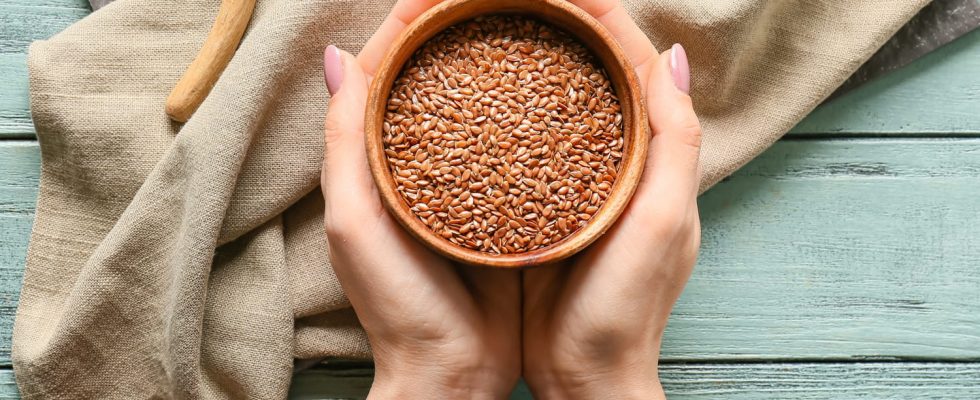Rich in omega 3, flax seeds are very healthy and easily consumed.
On sale in organic stores or organic sections of supermarkets, linseed have several health benefits to exploit.
Definition: what are flax seeds?
Flax is a plant available in whole seeds, in oil, or ground seeds (flour). These little seeds nutty taste are made from flax (Linum usitatissimum)a plant herbaceous plant cultivated for millennia and probably originally from Asia. Particularly rich in alpha-linolenic acid, that is to say in omega-3, flax seeds are known to effectively combat constipation. Flax seeds also help lower cholesterol and of fight against stomach aches when they were crushed and then left for half an hour in water.
What health benefits?
► Particularly rich in fiber, flax seeds promote intestinal transit. They fight effectively against constipation without irritating the intestinal mucosa. Recipe for constipation : Put a teaspoon of flax seeds in a glass of water. Leave to sit overnight and drink in the morning when you wake up.
► They are also distinguished by a interesting vegetable protein content (24%), one good iron capital and minerals (calcium, magnesium, potassium, phosphorus).
► They do not contain no gluten. This is a real plus for the intolerant!
► They protect your system cardiovascular. . The soluble fiber in flaxseed may lower blood cholesterol levels.
► They would warn some cancers (including that of the breast) thanks to their powerful antioxidants which are lignans. Flaxseed is one of the plant sources richest in lignans, providing up to 800 times more lignans than most other foods. Lignans are phytoestrogens, which help protect against certain types of cancer, including breast and colon cancers, by blocking the formation of tumors.
► They would also reduce hot flashes according to one 2007 study*.
► Also, their richness in antioxidants is a real obstacle to premature aging skin.
► They also have a soothing effect on the skin in the event of redness. Recipe for irritated skin: Pour water over the flax flour, mix to obtain a smooth paste. Allow to cool and apply to a one cm thick compress as a poultice up to three times a day.
► Flaxseed is gluten free.
What are the dangers of flax seeds?
Beyond a tablespoon, they are laxatives. Avoid in case of colonic diverticulitisin people who have had a digestive ostomy or in case of intestinal obstruction. If you want to use linseed oil, know that you should only use it that in seasoning, do not heat it and keep in the refrigerator for a maximum of 3 months. Linseed oil is not recommended for children under 3 years old.
How to consume ground flax seeds?
A rounded tablespoon per day is enough to cover daily omega-3 needs. However, do not lose sight of the fact that this consumption must also be accompanied by a reduction in the consumption of foods rich in omega-6. To best assimilate their benefits, consume them in ground or crushed form and store the grind in an airtight container in the refrigerator to protect the fatty acids from oxidation. Stay at sprinkle your salads or to integrate into your dairy products or preparations. THE soak beforehand (8 hours at least) also allows them to better assimilate their minerals. Flaxseeds are not eaten cooked because they do not tolerate heat well.
- Consume flax seeds in wholemeal bread or adding them to breakfast cereals
- Consume flax seeds whole as an aperitif or in dishes.
- Eat ground flax seeds and add them to desserts such as crumble. They can also replace an egg if mixed with 3 tablespoons of water.
What is the nutritional composition of flax seeds?
Those are wells of polyunsaturated fatty acids, in particular ofOmega 3. The latter have the reputation of lowering bad cholesterol (LDL cholesterol) so they have a beneficial effect on the cardiovascular system. Without forgetting that they are essential for the synthesis of the fatty acids EPA and DHA which the heart and nervous system need to function properly.
| NUTRIENTS | FLAX SEEDS: CONTENT PER 100 G |
|---|---|
| Proteins | 20.2g |
| Carbohydrates | 6.6g |
| – with sugar | 1.55g |
| Dietary fiber | 27.3g |
| Lipids | 36.6g |
| – including cholesterol | 0.0 mg |
| – of which saturates | 3.17g |
| – of which monounsaturated fatty acids | 6.51g |
| – of which polyunsaturated fatty acids | 24.9g |
| Water | 5.93g |
How many calories in flax seeds?
506 Cal/100g on the counter represented mainly by lipids. Even though they are made up of good fats, they are lipid nuggets so to consume with moderation.
What is linseed oil?
Linseed oil is produced by cold pressing of seeds to extract the oil. The oil is sold in brown bottles to ensure its quality. It is important to use the oil before its expiration date and, once the bottle is opened, it should be refrigerated and used according to the manufacturer’s recommendations, usually within 6 weeks.
- Flax seeds can be stored whole for a year in an airtight container at room temperature.
- If they are ground, it is best to consume them directly or store them in the refrigerator.
- If they are soaked, they should not be stored for more than 3 days in a cool place.
Should you choose brown or golden flax seeds?
Brown or golden flaxseed is a matter of taste: there is no real difference in terms of nutritional benefits. But choose them preferably from organic farming. You can easily find them in health food and organic stores, or even in supermarkets.
- *Pilot evaluation of flaxseed for the management of hot flashes. Pruthi S, Thompson SL, et al. J Soc Integr Oncol. 2007 Summer;5(3):106-12.
